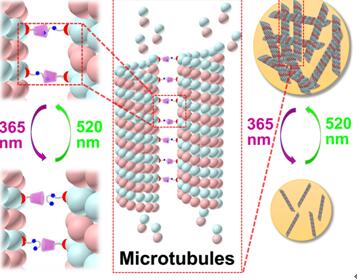Liu Yu's group’s research result about “Light-controlled tubulin supramolecular assembly with paclitaxel-modified cyclodextrin as a medium” pubilished on Angew. Chem. Int. Ed.
To gain a deeper understanding of the effects of molecular self-assembly behavior on life activities, supramolecular chemists have designed different nano-assembly systems to accurately simulate and control the motion processes of living organisms. Among them, microtubules, as an important part of the cytoskeleton, play a key role in the process of cell mitosis. However, the polymerization and depolymerization of tubulin at the molecular level has always been a challenging task.

Recently, Liu Yu's group modified β-cyclodextrin and azophenyl groups to paclitaxel molecules respectively, utilizing the specific binding of paclitaxel molecular skeleton to tubulin, and reversible bonding between azobenzene molecules and the β-cyclodextrin cavity under ultraviolet and visible light irradiation to regulate the aggregation state of tubulin, thereby affecting cell activity. Spectroscopic experiments show that azobenzene molecules containing paclitaxel have excellent photoisomerization properties in solution; SEM experiments show that only in the presence of trans azobenzene modified paclitaxel and β-cyclodextrin modified paclitaxel, significant polymerization occurs between the tubulin, and the morphology of the tubulin is converted from a filamentous polymer to a spherical nanoparticle with a larger particle size. It was further found by staining the cells that the aggregated microtubules were widely distributed in the cells, which could strongly change the morphology of the cells and eventually lead to cell death. This work provides a new strategy for regulating the aggregation behavior of biological macromolecules.
The study was funded by the National Natural Science Foundation and Nankai University. The first author of this work was Dr. Zhang Wei from the College of Chemistry, and the cell experiment was supported by Dr. Yu Qilin from the College of Life Sciences. It is worth mentioning that two undergraduates from the College of Chemistry, Zhang Niyuan and Xiao Kui, also participated in important chemical synthesis and properties characterization. Related results were published in Angew. Chem. Int. Ed. 2018, 57, 8649–8653 and were selected as current Hot Papers.

